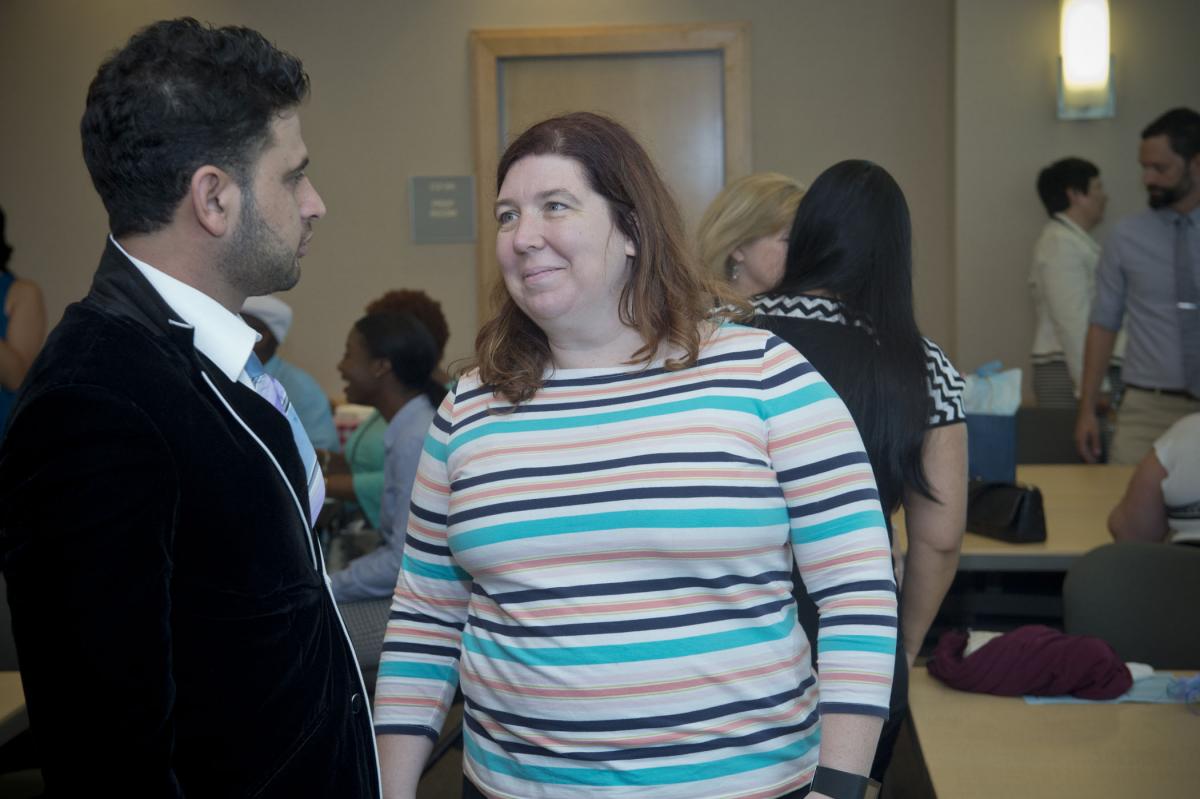Balancing Needs: How One Professor Teaches Nurses How To Care For Themselves

As part of their job description, registered nurses are expected to carry out emotionally-fraught tasks that most workers simply wouldn’t be able to handle. Treating bloody wounds, caring for the dying infants, consoling grieving families, and constantly adapting to unexpected life and death situations are just some of the stressful duties that nurses must perform on a regular basis.
But how do nurses preserve their own mental health after handling all of the responsibilities of the profession? How do they cope? Who can they talk to?
The truth is, RNs are trained to take care of everybody but themselves, according to Lisa Johnson, assistant professor of Nursing at Community College of Philadelphia. Johnson has done extensive doctoral research on the dichotomy that exists between RNs as caregivers and self-neglectors, which she says plenty of nurses are.
Her study, “Balancing Needs: Pediatric Nurses’ Experiences With Exposure to the Traumatic Events of Children,” presented in July at the 27th International Nursing Research Congress in Capetown, South Africa, bears this out and is advancing approaches to improve nurses’ work environments, self-care, job satisfaction and nurse retention and recruitment.
The turnover rate for bedside RNs increased to 17.2 percent in 2015, up from 16.4 percent in 2014, according to a 2016 report published by Nursing Solutions, Inc.
“Nursing school prepares you for trauma in a health-care setting, but it doesn’t teach you how to handle your own responses to it,” said Johnson, who is also an oncology nurse. .””Self-awareness is key because often times are emotions are contagious without us even realizing it. If I enter a room feeling stressed and anxious, many times it increases the stress and anxiety of those around me, even the youngest of children.”
Johnson’s work goes a long way in addressing the changing needs of a healthcare workforce that provides care in vulnerable communities, all while grappling with changing demographics and emergency situations ranging from extreme weather to mass shootings.
“It is critical that health care educators not only understand the changing health care environment of the future but also recognize that the students in their programs are not the same type of student that sat in classrooms 10 years ago or even five years ago, said Dr. Mary Anne Celenza, dean of the College’s Division of Math, Science and Health Careers. ”The diversity of this generation of new health care workers will not only bring different perspectives to health care, but will also bring more knowledge of cultural differences, greater interest in working in teams and reliance on social media as well as a greater desire to integrate their work into their personal time.”
Community College of Philadelphia, where Johnson works, is the only open-access public institution in the city. She works on a dedicated staff that is leading an effort to create a culturally competent pipeline of health-care workers for the region. Of the nursing students enrolled in the 2014-2015 academic year, approximately 42 percent were white, 33 percent were African American, 9 percent were Asian and 6.5 percent were Hispanic. Twenty-five percent were males.
Whether it be learning how to be aware of their trainees’ emotions, acknowledging them, practicing self-care, or preparing to work in culturally diverse neighborhoods, the nursing program, which has
graduated over 3,500 students since 1968, encourages staff to reflect on contemporary workplace challenges in an effort to prepare students for the issues –emotionally and technical- they eventually will face.
The Department of Nursing at the College just received a $350,000 Workforce Diversity Grant from the U.S. Health Resources and Services Administration (HRSA) to launch a program that will provide second-year nursing students from disadvantaged backgrounds an accelerated pathway to graduation. The primary objective is to increase the pipeline of nurses who have bachelor’s degrees within the City.
Together with the National Nursing Centers Consortium and West Chester University, the program will provide 14 students with mentoring, accelerated coursework, financial support and the opportunity to take as many as nine additional credits toward a bachelor’s degree. In addition, eligible students in both the first and second year of the program received resources such as books, software programs, and financial literacy training. Each of these resources is focused on helping students to succeed in the nursing program.
“The nursing program is committed to increasing diversity of the nursing workforce and addressing social determinants of health in vulnerable communities,” said Dr. Barbara N. McLaughlin, head of the Department of Nursing at the College. “The College draws together students from a wide range of ages and backgrounds and seeks to provide the programs and support they need to achieve their goals.”
In other news, the Department of Nursing at the College received its fourth consecutive designation as a Center of Excellence for creating environments that enhance student learning and professional development from the National League for Nursing. The designation is for the period 2016-2021. a